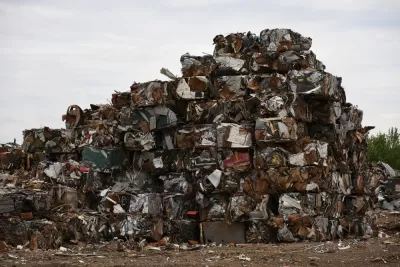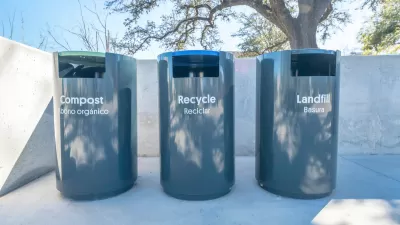A number of U.S. cities have set ambitious zero-waste goals, but reaching targets has been challenging. Turning waste into a viable commodity is one strategy to get materials out of the waste stream.

James A. Anderson takes a closer look at cities working to meet zero-waste targets, particularly efforts to commodify waste materials. Cities including San Francisco, Austin, and New York are struggling to reach their goals because of budget limitations, rising costs, and decreasing disposal options.
One approach has been economic development that seeks to remove trash from the waste stream. Austin’s 2011 zero-waste plan lays out strategies for diverting 90 percent of waste from landfills and incinerators by 2040. The city also has focused on commercial waste, which makes up a significant proportion of Austin's overall trash output. The [Re]Verse Pitch Competition is one attempt to engage entrepreneurs in waste disposal efforts, says Anderson:
The competition’s challenge is to devise a business plan that makes something marketable out of heaps of trash that nearby companies and nonprofits are eager to donate to the cause. In past years, starter donations have included expired canned goods from a food pantry, damaged pressboard furniture, distillery dregs, and even a mound of used mesh delivery bags.
The city has also put resources into the Austin Materials Marketplace, an online platform to link businesses and organizations with waste materials they can use and that otherwise would likely end up in landfills.
"Creating bonafide demand for plastic, paper, glass, food waste and other materials removed completely out of Austin’s garbage would not only give those programs a financial boost, it would transform zero-waste programs from budgetary burdens to possible economic boons," notes Anderson.
FULL STORY: Can Cities Ever Reach Absolute Zero (Waste)?

Alabama: Trump Terminates Settlements for Black Communities Harmed By Raw Sewage
Trump deemed the landmark civil rights agreement “illegal DEI and environmental justice policy.”

Study: Maui’s Plan to Convert Vacation Rentals to Long-Term Housing Could Cause Nearly $1 Billion Economic Loss
The plan would reduce visitor accommodation by 25% resulting in 1,900 jobs lost.

Planetizen Federal Action Tracker
A weekly monitor of how Trump’s orders and actions are impacting planners and planning in America.

Waymo Gets Permission to Map SF’s Market Street
If allowed to operate on the traffic-restricted street, Waymo’s autonomous taxis would have a leg up over ride-hailing competitors — and counter the city’s efforts to grow bike and pedestrian on the thoroughfare.

Parklet Symposium Highlights the Success of Shared Spaces
Parklets got a boost during the Covid-19 pandemic, when the concept was translated to outdoor dining programs that offered restaurants a lifeline during the shutdown.

Federal Homelessness Agency Places Entire Staff on Leave
The U.S. Interagency Council on Homelessness is the only federal agency dedicated to preventing and ending homelessness.
Urban Design for Planners 1: Software Tools
This six-course series explores essential urban design concepts using open source software and equips planners with the tools they need to participate fully in the urban design process.
Planning for Universal Design
Learn the tools for implementing Universal Design in planning regulations.
Caltrans
Smith Gee Studio
Institute for Housing and Urban Development Studies (IHS)
City of Grandview
Harvard GSD Executive Education
Toledo-Lucas County Plan Commissions
Salt Lake City
NYU Wagner Graduate School of Public Service




























